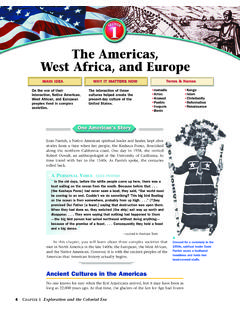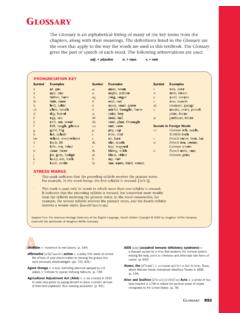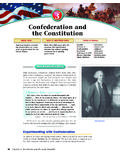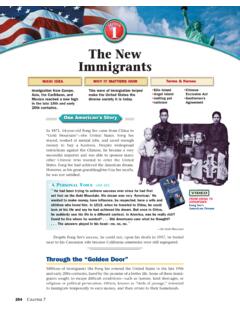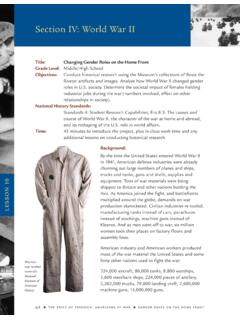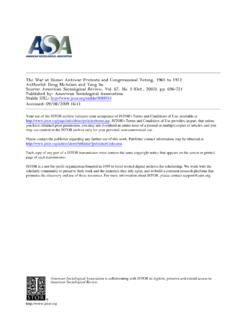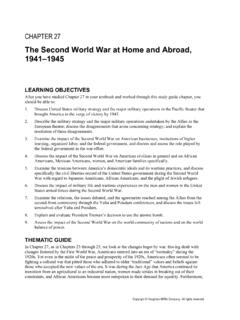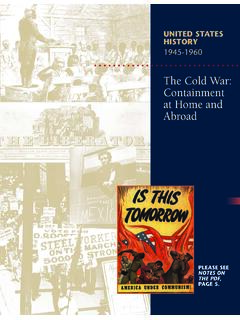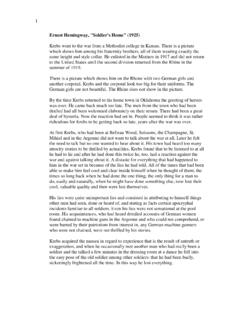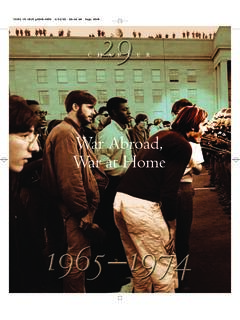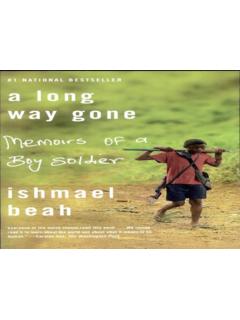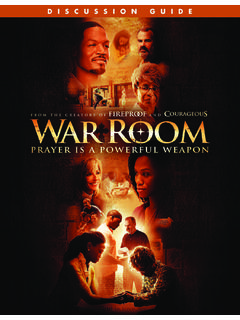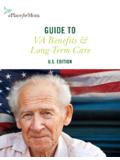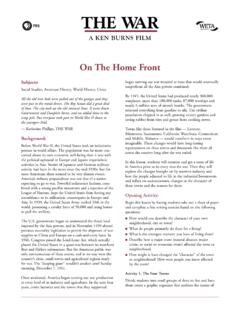Transcription of The Cold War at Home - mrlocke.com
1 616 CHAPTER18 One American's StoryTony Kahn made the neighbors uncomfortable because theythought his father, Gordon Kahn, was a Communist. In 1947,Gordon Kahn was a successful screenwriter. However, when acongressional committee began to investigate Communists inHollywood, Kahn was blacklisted named as unfit to hire. Later, in 1951, he was scheduled to testify before the save himself, Gordon Kahn simply had to name others as Communists, but he refused. Rather than face the con-gressional committee, he fled to Mexico. Tony Kahn remembershow the cold War hurt him and his PERSONALVOICETONY KAHN The first time I was called a Communist, I was four years old.
2 I ll never forget the look in our neighbors eyes when I walked by. I thought it was hate. I was too young to realize it was fear. fromThe cold War Comes HomeThe members of the Kahn family were among thousands of victims of the anti-Communist hysteria that gripped this country inthe late 1940s and early 1950s. By the end of the period, no one wasimmune from of Communist InfluenceIn the early years of the cold War, many Americans believed that there was goodreason to be concerned about the security of the United States. The Soviet domi-nation of Eastern Europe and the Communist takeover of China shocked theAmerican public, fueling a fear that communism would spread around the world.
3 In addition, at the height of World War II, about 100,000 Americans claimedmembership in the Communist Party. Some people feared that the first loyalty ofthese American Communists was to the Soviet & NamesTerms & NamesMAIN IDEAMAIN IDEAWHY IT MATTERS NOWWHY IT MATTERS NOW HUAC Hollywood Ten blacklist Alger Hiss Ethel and JuliusRosenberg Joseph McCarthy McCarthyismDuring the late 1940s andearly 1950s,fear ofcommunism led to recklesscharges against today remain vigilantabout unfounded accusations. Tony KahnThe cold War at HomeTHE cold WARCOMES HOMEH ollywoodBlacklists theKahn FamilyALOYALTY REVIEW BOARDS trongly anti-CommunistRepublicans began to accuse Truman of being soft on com-munism.
4 Consequently, in March 1947, President Trumanissued an executive order setting up the Federal EmployeeLoyalty Program, which included the Loyalty Review purpose was to investigate government employees andto dismiss those who were found to be disloyal to the The attorney general drew up a list of 91 subversive organizations; membership in any of thesegroups was grounds for suspicion. From 1947 to 1951, government loyalty boards investi-gated million employees and dismissed 212 as securityrisks. Another 2,900 resigned because they did not want tobe investigated or felt that the investigation violated theirconstitutional rights.
5 Individuals under investigation werenot allowed to see the evidence against HOUSE UN-AMERICAN ACTIVITIES COMMITTEEO ther agencies investigated possible Communist influence,both inside and outside the government. The mostfamous of these was the House Un-American ActivitiesCommittee (HUAC).HUAC first made headlines in 1947,when it began to investigate Communist influence in themovie industry. The committee believed that Communistswere sneaking propaganda into films. The committee pointed to the pro-Soviet films made during World War IIwhen the Soviet Union had been a United States subpoenaed 43 witnesses from the Hollywoodfilm industry in September 1947.
6 Many of the witnesseswere friendly, supporting the accusation that Communistshad infiltrated the film industry. For example, the movie starGary Cooper said he had turned down quite a few scriptsbecause I thought they were tinged with Communisticideas. However, when asked which scripts he meant,Cooper couldn t remember their unfriendly witnesses were called to testify butrefused. These men, known as the Hollywood Ten,decided not to cooperatebecause they believed that the hearings were unconstitutional. Because theHollywood Ten refused to answer questions, they were sent to prison.
7 617 Protestersdemonstrate insupport of theHollywood Ten. SPOTLIGHTSPOTLIGHTHISTORICALHISTORICALPA UL ROBESONPaul Robeson was an all-American football player and PhiBeta Kappa member at RutgersUniversity. After earning a lawdegree in 1923, he began a distinguished international careeras a singer and actor. He was avocal civil rights activist, and hewas sympathetic to the Soviet culture and political 1950, when he refused tosign an affidavit indicating whetherhe had ever been a member ofthe Communist Party, the StateDepartment revoked his passportfor eight years. During that time,he was unable to per form abroadand was blacklisted at home .
8 Hisincome fell from $150,000 ayear to $3,000 a IDEAMAIN IDEAAD rawingConclusionsHow did theLoyalty ReviewBoard pose athreat to civilliberties?In response to the hearings, Hollywood executives instituted a blacklist,alist of people whom they condemned for having a Communist who were blacklisted approximately 500 actors, writers, producers, anddirectors had their careers ruined because they could no longer MCCARRAN ACTAs Hollywood tried to rid itself of Communists,Congress decided that Truman s Loyalty Review Board did not go far enough. In1950, Congress passed the McCarran Internal Security Act.
9 This made it unlawfulto plan any action that might lead to the establishment of a totalitarian dictator-ship in the United States. Truman vetoed the bill, saying, In a free country, wepunish men for the crimes they commit, but never for the opinions they have. But Congress enacted the law over Truman s Cases Stun the NationTwo spy cases added to fear that was spreading like an epidemic across the coun-try. One case involved a former State Department official named Alger HISSIn 1948, a former Communist spy named Whittaker ChambersaccusedAlger Hissof spying for the Soviet Union. To support his charges,Chambers produced microfilm of government documents that he claimed hadbeen typed on Hiss s typewriter.
10 Too many years had passed for government pros-ecutors to charge Hiss with espionage, but a jury convicted him of perjury forlying about passing the documents and sent him to jail. A young conservativeRepublican congressman named Richard Nixon gained fame for pursuing thecharges against Hiss. Within four years of the highly publicized case, Nixon waselected vice president of the United claimed that he was innocent and that Chambers had forged the docu-ments used against him. However, in the 1990s, Soviet cables released by theNational Security Agency seemed to prove Hiss s 1954, the Communist-hunting senator Joseph McCarthy,in Senate hearings that weretelevised live, accused the of coddling Communists.



